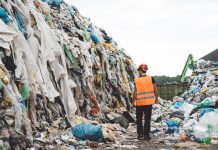Maria Nikolopoulou, EESC member, argues that the European Circular Economy Stakeholder Platform is Europe’s best bet for a sustainable future
As the world grapples with climate change, resource scarcity and geopolitical instability, one solution continues to gain momentum: the circular economy. Going circular could considerably reduce waste, lower emissions and drive sustainable economic prosperity. This transition is crucial for achieving the European Green Deal’s ambitions and getting the UN Sustainable Development Goals (SDGs) back on track.
For the EU, 2025 will be a circular economy year. For the first time, the circular economy is clearly included in the title of a European Commissioner. We expect a Clean Industrial Deal, a Bioeconomy Strategy and a Circular Economy Act. And yet, one of the most significant obstacles to circularity is fragmentation. Without coordination and the creation of synergetic ecosystems, businesses, NGOs, and policymakers are in danger of working at cross purposes, leading to inefficiencies and missed opportunities.
The European Circular Economy Stakeholder Platform
The European Circular Economy Stakeholder Platform (ECESP) bridges this gap and unites diverse actors working towards a common goal: transitioning Europe to a sustainable and circular economy. Established in 2017 by the European Commission and the European Economic and Social Committee (EESC), the platform drives circular initiatives across the continent, fosters policy dialogue between EU institutions and industry leaders and creates new opportunities for investment and innovation.
The unique feature of the ECESP is its bottom-up approach, with its coordination group made up of representatives from leading organisations in this area. These representatives are the platform’s driving force as they act as ECESP ambassadors and steer its activities.
These dedicated members organise EU Circular Talks throughout the year and free online workshops covering various topics. The topics range from consumer behaviour, taxonomy and bioremediation to procurement, circular models for fashion, construction, social enterprises and more.
The ECESP website is a key resource centre that provides access to case studies, reports, position papers, joint declarations, and tools that facilitate the implementation of the circular economy. The platform is a rich content depository with over 3,000 items, including 800 good practices submitted by the circular economy community. The community exchanges thoughts and conversations on LinkedIn and Bluesky.
However, for organised civil society, the ECESP is more than just a forum for discussion – it is a space where social justice, equity and community-led initiatives must be actively championed. The challenge remains to ensure that the circular economy does not merely reinforce existing economic structures but instead fosters a ‘circular society’ and a genuinely inclusive and just transition that benefits all citizens, workers and small enterprises.
Circularity is more than reducing waste
Circularity is not just about reducing waste; it is about rethinking the economy from the ground up. In the hierarchy of circular economy actions, those most preferred are ‘reduce’ and ‘re-use’, which will inevitably impact the manufacturing sectors. Nevertheless, if appropriately designed, the circular economy could create decent jobs, strengthen supply chains and make Europe less dependent on raw materials from abroad – a critical advantage in an era of geopolitical uncertainty.
The conversation around circularity will take centre stage in Brussels at the ECESP Annual Conference on 3-6 of June. This year, the ECESP is joining forces with the European Commission’s annual Green Week event, whose central theme will be the circular economy. A warm-up event on 10 April will also pave the way for the annual conference in a bit to turn ambitious ideas into tangible initiatives. The conference will update EU circular economy legislation, put civil society organisations in the spotlight by showcasing inspiring circular projects and strengthen international cooperation to scale up circularity.
The road ahead: The shift to a circular economy
The shift to a circular economy is no longer a niche discussion but a necessity. From fashion to food systems, construction to consumer goods, how we produce and consume will change whether we like it or not as the current trend exceeds our planetary limitations. The ECESP is helping to lay the foundations for the transition to occur in an organised way that will benefit people and the planet.
The road ahead requires vigilance, engagement, and commitment. But we need political will and collective action to turn vision into reality. The question is not whether Europe will embrace circularity but whether it will do so in time to reap the benefits and lead the way on the international chessboard.











